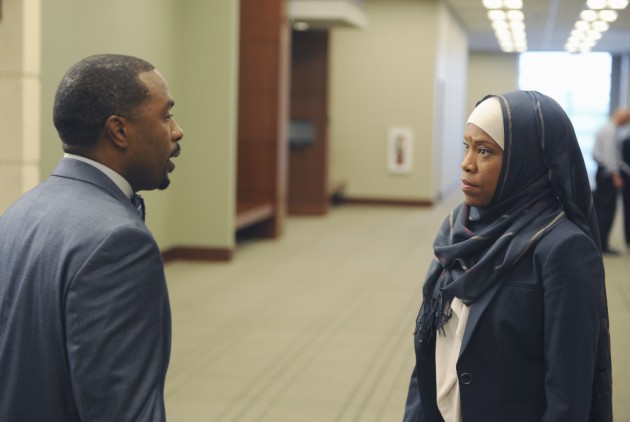
American Crime‘s utter hopelessness is its most enigmatic, and equally frustrating, quality: there isn’t really a show on television as openly dour as American Crime, the story where every single character gets karmic justice through the injustices of life and the legal system. It really makes for a weird television experience: the harder American Crime tries to make its points about personal, moral complexities and the spiderweb effect of tragedy on the delicate realities we build for ourselves, the less engaging a piece of dramatic material it becomes. Yet when American Crime lets its visuals do the talking – like a scene in “Episode Five” where Aliyah, head obscured by the frame of a shot, reaches to touch her brother’s face – it becomes an evocative piece of work, though one that never quite escapes its endlessly dour nature.
It’s a shame, because there are a lot of interesting ideas American Crime is presenting, particularly with how families attempt to process tragedies they don’t understand; though Crime approaches these ideas in a very broad way (and often, through over-explanation), there’s something to be said for how “Episode Six” depicts the loss of Alonzo’s wife and what it meant for the Gutierrez family, or how Aliyah’s realization of how she emotionally abandoned her brother. But there’s no solace to be found in these moments: at its core, American Crime is obsessed with depicting various injustices, be it through the legal system, how society has conversations about race, or how impossible it can be to escape the past. Yet, American Crime is portraying these injustices as some karmic version of justice: all of Barb’s complaining about her son’s death works in a vacuum of a mother in pain, but in the larger sense of things, she’s spent three months burying herself further and further into her racist delusions, so far as to hurt her own case by spouting cliched nonsense about how wronged white people are in the American legal system.
In Crime‘s attempt to be unwavering in its truth, it’s really undermined its most important moments: how can we engage with either Carter or Aubry, when all we’re being shown is delusional drug addiction? Are we supposed to empathize with Carter choosing to run with Aubry in “Episode Five” because he loves her, and feels abandoned by his sister? He even recognizes what he’s doing is stupid – but as he tries to explain away Aubry’s delusions about escaping, he indulges them, a dramatic construction that only makes Aubry more unlikable, and Carter even more of a passive character in his own story, weakening the effect of portraying a man trying to fight back against the various systems threatening his freedom. Barring some twist, American Crime seems to embrace the idea that Carter is guilty, whether of this crime or many others: so how are we supposed to empathize with his plight in the system?
The same applies to the increasingly arrogant Hector, who becomes a snitch a few weeks after declaring “I’ll never be a snitch!” Or Gwen, whose philandering continues to be determined the causing factor of Matt’s death, even as the show picks apart his credibility with drug addiction, forced military service, and any other number of heavy-handed moral accusations against his character… American Crime‘s agenda is so relentless, it only allows itself the occasional moment of nuance or growth, burying that little bit of light under scene after pessimistic scene, all building to create this ugly tower of hatred and injustice, a show that tries to make its point so forcefully, it often threatens turning its narrative into a parody of itself (again, Aubry’s character: despite the strong performance behind it, the material is just horrible and one-noted; she’s not a character we’re seeing struggle with addiction, as much as she is struggling with the simple truths of reality, which is much harder to empathize with).
Stories that avoid this are rare – but even though it continues to telegraph every step of its journey, Alonzo and Tony’s story continues to be the most arresting material American Crime has to offer. If there are true victims of circumstance on this show, it’s the Gutierrez family, and how the show’s depicted Tony’s descent (and Alonzo’s misguided attempts to protect his son) is the most fascinating one on the show, pushing away from the heavy-handed stories about the legal system and interracial tensions for a more nuanced (if predictable) tale about adolescent angst, and how that can be the most dangerous part of a young man’s life in the wrong neighborhood. American Crime continues to try and depict family members broken by their lack of a support system, yet that story really only finds its home with the Gutierrez clan, whose missing matriarch weighs heavier than the death of Matt (arguably the most important character on the show), tinged with the salacious details of drug dealing and “complex” portrayals about race.
In short, American Crime remains a very mixed bag, swinging wildly back and forth between the haunting portrayals of broken families, to the less nuanced look “inside” the legal system and how it approaches ‘justice’ in the modern age. Sometimes, Crime‘s unwavering ugliness provides an avenue for a challenging debate about our deep-seeded prejudices about race, or just makes for evocative television (like Gwen failing to remember the three weeks leading up to being attacked) – and other times, it just feels like punishment for the sake of punishment, a much more superficial approach to societal observation than its aesthetics present it to be.
[Photo via ABC]
 Follow Us
Follow Us





